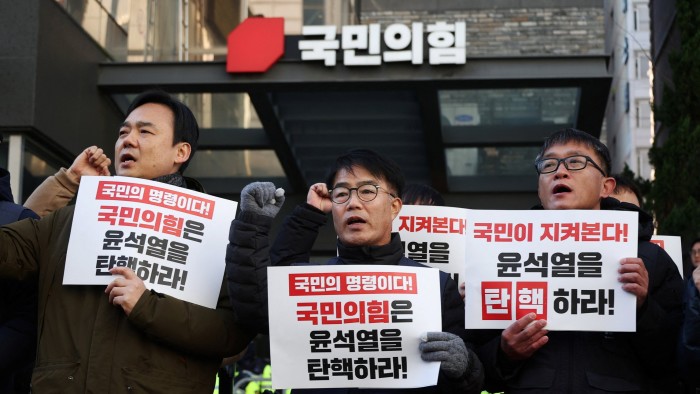Unlock the Editor’s Digest for free
Roula Khalaf, Editor of the FT, selects her favourite stories in this weekly newsletter.
South Korea’s President Yoon Suk Yeol has replaced his defence minister as he and his ruling party try to stave off an impeachment bid following his failed attempt to impose martial law.
Yoon on Thursday accepted the resignation of defence minister Kim Yong-hyun, who has been accused by members of his own party of being behind the president’s failed attempt to impose emergency rule. He named former general Choi Byung-hyuk to take the role.
Yoon’s declaration of martial law on Tuesday, and his subsequent climbdown, left the country in political turmoil and sparked calls for the 63-year-old former prosecutor to resign or face impeachment.
Opposition lawmakers, who have a parliamentary majority, have submitted an impeachment motion to the National Assembly and have sought a vote on Saturday.
The proceedings will probably require eight votes from Yoon’s own ruling People Power party, and pressure is building on its members to support the opposition-led motion.
However, party leader Han Dong-hoon said on Thursday that while he did not want to “defend” the president’s actions, he was working to rally his party’s members to block the impeachment motion.
“I’ll make efforts to block the impeachment motion in order to prevent any damage to the public and our supporters given the chaos it could bring,” said Han.
Opposition leaders argue that Yoon violated the constitution and other laws in his failed attempt to impose emergency rule, which included the dispatch of troops to the parliament building to block political opposition.
“He tried to exercise absolute power as the absolute ruler by controlling all national institutions, including constitutional authority,” said Lee Jae-myung, the Democratic party leader who narrowly lost the 2022 presidential election to Yoon. “In this context, Yoon must be impeached. [Ruling party lawmakers] should not become a force aligned with treason.”
South Korea’s presidential office on Thursday described the martial law declaration as a “warning” to opposition parties and said Yoon was not expected to make a public apology.
Kim said in submitting his resignation as defence minister that he was responsible for orders to soldiers to enact martial law. Still, the role of other military leaders is also under increasing scrutiny.
At the parliamentary hearing on Thursday, senior defence officials including Park Ahn-soo, the martial law commander and army general, and Kim Sun-ho, the vice-defence minister, said they were informed of the president’s plans after Yoon’s television statement on Tuesday evening. They blamed Kim, the defence minister, for the decision to dispatch troops.
Separately on Thursday, South Korean police opened an investigation into whether Yoon’s actions amounted to treason, while prosecutors and anti-corruption officials are reviewing whether to conduct their own investigations, state news agency Yonhap reported.
More than 70 per cent of South Koreans support impeaching Yoon in a survey of more than 500 people conducted by Realmeter, according to Yonhap.
Thousands of South Koreans have braved sub-zero temperatures over the past two nights, in the capital and other cities, to call for Yoon to stand down. Further protests and industrial action are planned ahead of Saturday’s vote.
“Some of the ruling party lawmakers will vote for his impeachment for their own political survival,” predicted Choi Young-taek, a 57-year-old insurance worker at a protest on Wednesday night. “Otherwise, they will all be destroyed. If he doesn’t get impeached, all Koreans will take to the streets to protest.”
Kim Hana, a 42-year-old pastor, said “everyone, regardless of their age and gender” believed it was crucial for the future of South Korea for Yoon to be removed from office. “I’ll keep attending these rallies because we have to unite to put pressure on parliament,” she added.
John Delury, an expert on Asian politics and visiting professor at Luiss University in Rome, said it was unclear how the country’s security agencies would respond to public anger and further protests ahead of the impeachment vote.
“That’s really critical in how the next few days play out, assuming that there are large-scale protests and demonstrations, that the police and soldiers are clearly there with orders to protect the crowd, not protect themselves,” he said.
Read the full article here




